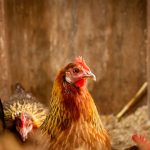Keeping alpacas and chickens together can be advantageous for both the animals and their caretakers. Alpacas are known for their docile nature, low maintenance requirements, and production of valuable fiber. Chickens, on the other hand, are efficient foragers and provide a steady supply of fresh eggs.
When cohabiting, these two species can develop a mutually beneficial relationship. However, successfully managing alpacas and chickens in the same environment requires careful consideration of several factors, including appropriate housing, proper nutrition, health management, and monitoring of inter-species interactions. This article will examine the potential benefits of co-raising alpacas and chickens, as well as discuss the necessary precautions and recommended practices for effectively maintaining both species on a single property.
Table of Contents
- 1 Benefits of Keeping Alpacas and Chickens Together
- 2 Considerations for Housing Alpacas and Chickens Together
- 3 Feeding and Nutrition for Alpacas and Chickens
- 4 Health and Veterinary Care for Alpacas and Chickens
- 5 Managing Behavior and Interactions Between Alpacas and Chickens
- 6 Conclusion and Tips for Successfully Keeping Alpacas with Chickens
- 7 FAQs
- 7.1 What are the benefits of keeping alpacas with chickens?
- 7.2 What should be considered before keeping alpacas with chickens?
- 7.3 How can alpacas and chickens be introduced to each other?
- 7.4 What are some potential challenges of keeping alpacas with chickens?
- 7.5 How can the health and safety of alpacas and chickens be maintained when kept together?
Key Takeaways
- Keeping alpacas and chickens together can be beneficial for both animals and the farm
- Housing considerations include providing separate shelters and fencing to prevent aggression and disease transmission
- Alpacas and chickens have different nutritional needs, so it’s important to provide appropriate feed and supplements
- Regular veterinary care and monitoring for signs of illness are essential for maintaining the health of both alpacas and chickens
- Managing behavior and interactions between alpacas and chickens can be achieved through proper socialization and supervision
Benefits of Keeping Alpacas and Chickens Together
There are numerous benefits to keeping alpacas and chickens together. Alpacas are natural guardians and can provide protection for chickens against predators such as foxes, raccoons, and birds of prey. Their larger size and natural curiosity make them excellent at keeping an eye out for potential threats to the flock.
Additionally, alpacas produce high-quality fiber that can be used for spinning, knitting, and weaving. By keeping alpacas and chickens together, owners can maximize the use of their land and resources, as alpacas can help keep pastures trimmed while chickens can forage for insects and other pests. This symbiotic relationship can lead to a more sustainable and efficient use of the land.
Furthermore, alpacas and chickens have different dietary needs, which means they are not in direct competition for food resources. Alpacas primarily graze on grass and hay, while chickens consume a diet of grains, seeds, insects, and vegetation. This allows for a diverse use of the available food sources on the property.
On the other hand, chickens can also provide benefits to alpacas. Chickens are excellent at foraging for insects and parasites, which can help reduce the parasite load on alpacas. Additionally, chickens produce eggs that can be a valuable source of protein for both humans and alpacas.
The manure produced by chickens can also be beneficial for the soil, providing essential nutrients for the pasture where the alpacas graze. Overall, keeping alpacas and chickens together can create a harmonious and mutually beneficial environment for both species.
Considerations for Housing Alpacas and Chickens Together

When housing alpacas and chickens together, there are several important considerations to keep in mind. Firstly, it is essential to provide separate housing areas for each species to ensure their safety and well-being. Alpacas require shelter from the elements, such as a three-sided shelter or barn, while chickens need a secure coop to protect them from predators.
It is important to ensure that the housing areas are well-ventilated, clean, and free from drafts to prevent respiratory issues in both alpacas and chickens. Additionally, the fencing around the housing areas should be secure and predator-proof to protect both species from potential threats. Another consideration is the layout of the pasture or grazing area.
Alpacas and chickens have different grazing habits, with alpacas preferring to graze on grass and hay while chickens forage for insects and vegetation. It is important to provide separate grazing areas for each species to prevent competition for food resources. Rotational grazing can be an effective strategy to ensure that both alpacas and chickens have access to fresh pasture while allowing the land to rest and regenerate.
Furthermore, it is important to consider the potential health risks associated with housing alpacas and chickens together. Alpacas are susceptible to certain diseases that can be transmitted by chickens, such as coccidiosis and blackhead disease. It is essential to work closely with a veterinarian to develop a comprehensive health care plan that includes regular vaccinations, parasite control, and monitoring for signs of illness in both alpacas and chickens.
Feeding and Nutrition for Alpacas and Chickens
Feeding and nutrition are crucial aspects of caring for both alpacas and chickens when they are housed together. Alpacas are primarily grazers and require access to high-quality pasture or hay to meet their dietary needs. They also require a mineral supplement to ensure they receive essential nutrients such as copper, zinc, and selenium.
Additionally, alpacas should have access to fresh water at all times to prevent dehydration. Chickens have different dietary requirements than alpacas and require a balanced diet that includes grains, seeds, insects, vegetation, and commercial feed. It is important to provide access to grit for chickens, which helps them digest their food properly.
Additionally, chickens require calcium supplements to support egg production and prevent issues such as soft-shelled eggs. When feeding alpacas and chickens together, it is important to consider their different dietary needs and provide separate feeding areas to prevent competition for food resources. This can be achieved by using feeders designed specifically for each species or by feeding them at different times of the day.
It is also important to monitor their body condition regularly to ensure they are receiving adequate nutrition.
Health and Veterinary Care for Alpacas and Chickens
Maintaining the health of alpacas and chickens when they are housed together requires careful attention to preventive care and prompt treatment of any health issues that may arise. Regular veterinary check-ups are essential for both species to monitor their overall health and address any potential concerns. Alpacas should receive vaccinations against common diseases such as clostridial diseases, tetanus, and respiratory infections.
Additionally, regular fecal testing should be conducted to monitor parasite levels in alpacas. Chickens also require regular veterinary care to monitor their health and address any potential issues. Vaccinations against common poultry diseases such as Marek’s disease, Newcastle disease, and infectious bronchitis are essential to prevent outbreaks within the flock.
Additionally, regular parasite control measures should be implemented to prevent issues such as mites, lice, and internal parasites. It is important to monitor the interactions between alpacas and chickens to ensure that they are not causing stress or injury to each other. Aggressive behavior from either species should be addressed promptly to prevent injuries.
Additionally, it is important to provide appropriate shelter and protection from extreme weather conditions to prevent health issues such as heat stress or hypothermia.
Managing Behavior and Interactions Between Alpacas and Chickens

Understanding Alpaca Behavior
It is essential to introduce new animals gradually and monitor their interactions closely to prevent aggression or stress. Alpacas may defend their territory, so it’s crucial to provide adequate space and resources to reduce competition and tension.
Meeting the Needs of Chickens
Chickens are social animals that establish a pecking order within the flock. To prevent overcrowding and reduce aggressive behavior, it’s vital to provide adequate space within the coop. Enrichment activities such as perches, dust baths, and access to the outdoors can help reduce stress and prevent behavioral issues within the flock.
Introducing Alpacas and Chickens
When introducing alpacas and chickens to each other, it’s crucial to do so gradually in a controlled environment. This can help prevent stress or injury to either species during the introduction process. Providing separate feeding areas for alpacas and chickens can also help reduce competition for food resources and minimize potential conflicts between the two species.
By following these guidelines, owners can create a harmonious environment where alpacas and chickens can thrive together.
Conclusion and Tips for Successfully Keeping Alpacas with Chickens
In conclusion, keeping alpacas with chickens can be a rewarding experience that provides numerous benefits for both species. By carefully considering their housing, feeding, health care, behavior, and interactions, owners can create a harmonious environment where alpacas and chickens can thrive together. Providing separate housing areas, grazing spaces, feeding areas, and veterinary care for each species is essential for their well-being.
Some tips for successfully keeping alpacas with chickens include:
– Providing secure housing areas for both species
– Offering separate grazing areas to prevent competition for food resources
– Monitoring their health regularly through veterinary check-ups
– Managing their behavior and interactions through gradual introductions
– Providing enrichment such as perches, dust baths, and access to the outdoors By following these tips and considering the unique needs of both alpacas and chickens, owners can create a sustainable and mutually beneficial environment where both species can thrive together. With proper care and management, keeping alpacas with chickens can be a fulfilling experience that provides valuable resources such as fiber, eggs, pest control, and companionship for both animals and their owners.
If you’re considering keeping alpacas with chickens, you may also be interested in learning about the compatibility of geese and chickens. This article on Poultry Wizard discusses whether geese can eat chicken feed and provides valuable insights into managing different poultry species together.
FAQs
What are the benefits of keeping alpacas with chickens?
Keeping alpacas with chickens can provide several benefits, including protection for the chickens from predators, as alpacas are natural guardians. Alpacas can also help keep the pasture clean by eating weeds and grass, and their manure can be used as fertilizer for the garden.
What should be considered before keeping alpacas with chickens?
Before keeping alpacas with chickens, it’s important to consider the space and shelter requirements for both animals. Alpacas and chickens have different dietary needs, so their feeding and grazing areas should be separate. Additionally, it’s important to monitor the interactions between the two species to ensure they get along well.
How can alpacas and chickens be introduced to each other?
When introducing alpacas and chickens, it’s best to do so gradually and in a controlled manner. Start by allowing the animals to see and smell each other through a fence or barrier. Once they are comfortable with each other’s presence, supervised interactions can be allowed. It’s important to monitor the interactions closely to ensure the safety of both animals.
What are some potential challenges of keeping alpacas with chickens?
Some potential challenges of keeping alpacas with chickens include the risk of disease transmission between the two species, as well as the potential for aggression from the alpacas towards the chickens. Additionally, alpacas and chickens have different dietary needs, so it’s important to ensure they have separate feeding areas to prevent competition for food.
How can the health and safety of alpacas and chickens be maintained when kept together?
To maintain the health and safety of alpacas and chickens when kept together, it’s important to provide separate feeding and grazing areas for each species. Regular monitoring of the animals’ interactions is also crucial, as well as ensuring that both species have access to clean water and appropriate shelter. Additionally, regular veterinary care and parasite control are important for both alpacas and chickens.
Meet Walter, the feathered-friend fanatic of Florida! Nestled in the sunshine state, Walter struts through life with his feathered companions, clucking his way to happiness. With a coop that’s fancier than a five-star hotel, he’s the Don Juan of the chicken world. When he’s not teaching his hens to do the cha-cha, you’ll find him in a heated debate with his prized rooster, Sir Clucks-a-Lot. Walter’s poultry passion is no yolk; he’s the sunny-side-up guy you never knew you needed in your flock of friends!







